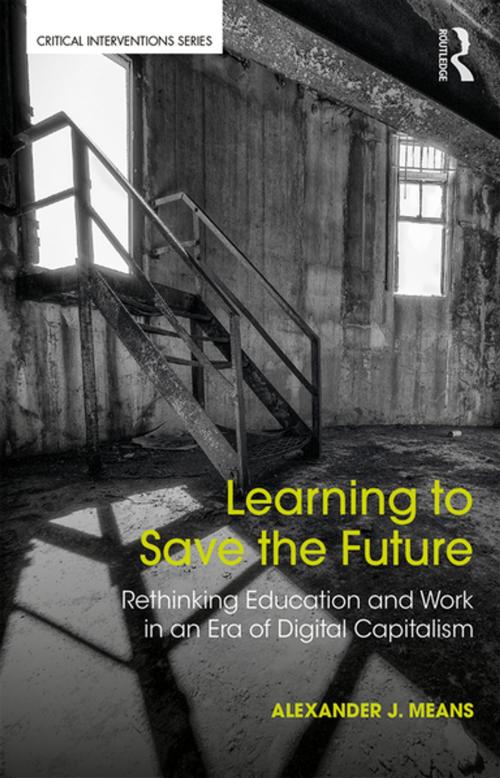Learning to Save the Future
Rethinking Education and Work in an Era of Digital Capitalism
Nonfiction, Social & Cultural Studies, Social Science, Sociology, Reference & Language, Education & Teaching| Author: | Alexander J. Means | ISBN: | 9781315450186 |
| Publisher: | Taylor and Francis | Publication: | April 9, 2018 |
| Imprint: | Routledge | Language: | English |
| Author: | Alexander J. Means |
| ISBN: | 9781315450186 |
| Publisher: | Taylor and Francis |
| Publication: | April 9, 2018 |
| Imprint: | Routledge |
| Language: | English |
Mainstream economists and Silicon Valley entrepreneurs claim that unfettered capitalism and digital technology can unlock a future of unbounded prosperity, create endless high paying jobs, and solve the world’s vast social and ecological problems. Realizing this future of abundance purportedly rests in the transformation of human potential into innovative human capital through new 21st century forms of education.In this new book Alex Means challenges this view. Stagnating economic growth and runaway inequality have emerged as the ‘normal’ condition of advanced capitalism. Simultaneously, there has been a worldwide educational expansion and a growing surplus of college-educated workers relative to their demand in the world economy. This surplus is complicated by an emerging digital revolution driven by artificial intelligence and machine learning that generates worker displacing innovations and immaterial forms of labor and valorization.
Learning to Save the Future argues that rather than fostering mass intellectuality, educational development is being constrained by a value structure subordinated to 21st century capitalism and technology. Human capabilities from creativity, design, engineering, to communication are conceived narrowly as human capital, valued in terms of economic productivity and growth. Similarly, global problems such as the erosion of employment and climate change are conceived as educational problems to be addressed through business solutions and the digitalization of education. This thought-provoking account provides a cognitive map of this condition, offering alternatives through critical analyses of education and political economy, technology and labor, creativity and value, power and ecology.
Mainstream economists and Silicon Valley entrepreneurs claim that unfettered capitalism and digital technology can unlock a future of unbounded prosperity, create endless high paying jobs, and solve the world’s vast social and ecological problems. Realizing this future of abundance purportedly rests in the transformation of human potential into innovative human capital through new 21st century forms of education.In this new book Alex Means challenges this view. Stagnating economic growth and runaway inequality have emerged as the ‘normal’ condition of advanced capitalism. Simultaneously, there has been a worldwide educational expansion and a growing surplus of college-educated workers relative to their demand in the world economy. This surplus is complicated by an emerging digital revolution driven by artificial intelligence and machine learning that generates worker displacing innovations and immaterial forms of labor and valorization.
Learning to Save the Future argues that rather than fostering mass intellectuality, educational development is being constrained by a value structure subordinated to 21st century capitalism and technology. Human capabilities from creativity, design, engineering, to communication are conceived narrowly as human capital, valued in terms of economic productivity and growth. Similarly, global problems such as the erosion of employment and climate change are conceived as educational problems to be addressed through business solutions and the digitalization of education. This thought-provoking account provides a cognitive map of this condition, offering alternatives through critical analyses of education and political economy, technology and labor, creativity and value, power and ecology.















